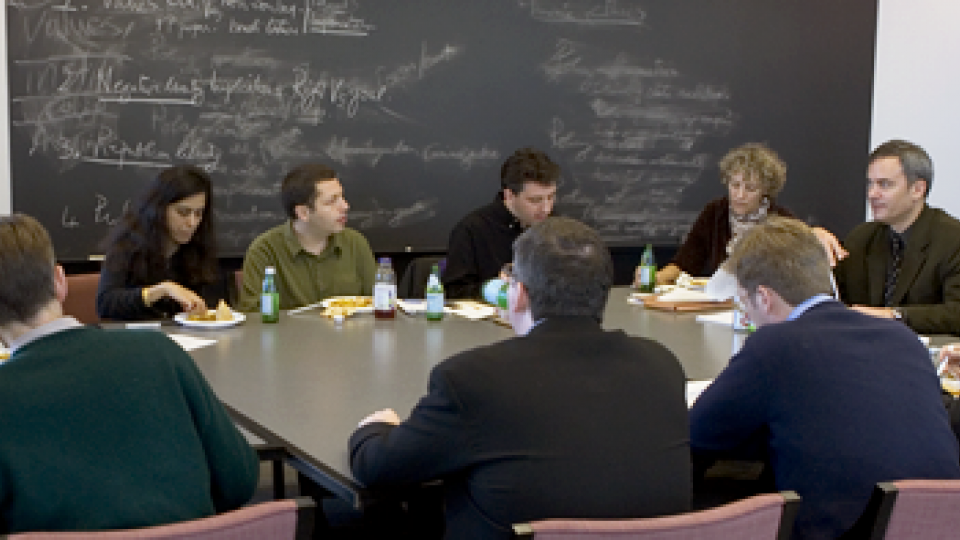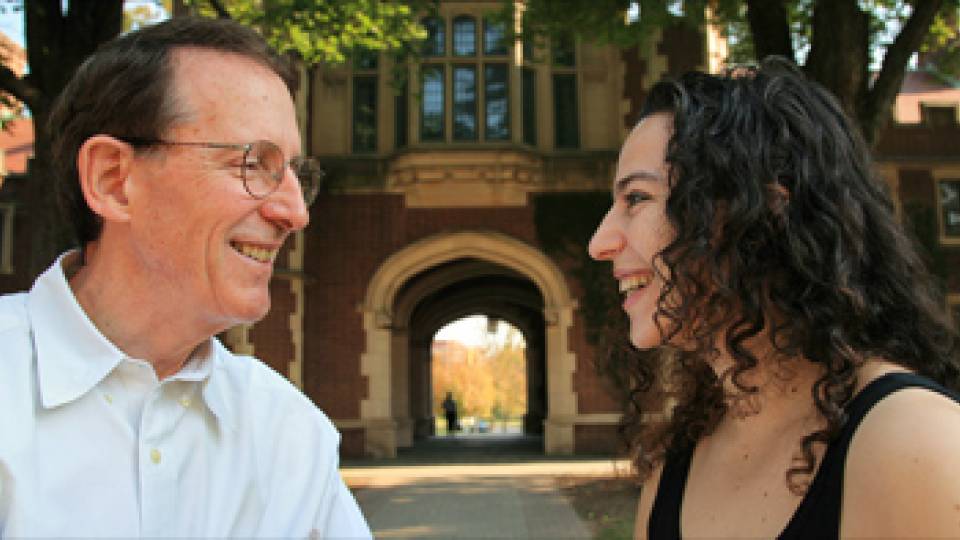Peter Singer is one of the world's best known philosophers, recognized for his thought-provoking views on topics including animal rights, bioethics and the plight of the world's poorest people.
Since 1999, he has been the Ira W. DeCamp Professor of Bioethics in the University Center for Human Values at Princeton University. He splits his time between Princeton and the University of Melbourne in his native Australia, where he is Laureate Professor.
Singer's influential books include "Animal Liberation," "Practical Ethics" and "Rethinking Life and Death." His book "The Life You Can Save" challenges readers to help improve the lives of the world's poorest people, and he is the co-founder of a nonprofit group by the same name that is devoted to effective philanthropy to serve people living in extreme poverty.
Singer also regularly writes brief essays on topics related to current events. A new book, "Ethics in the Real World," compiles many of those essays with other reflections to explore, in an easily accessible form, some of the deepest philosophical questions.
Singer recently answered questions about his book, philosophy and teaching at Princeton.

Peter Singer, one of the world's best-known philosophers, has been the Ira W. DeCamp Professor of Bioethics in the University Center for Human Values at Princeton University since 1999. (Illustration by Matilda Luk, Office of Communications)Click to enlarge.
Why do you write the kinds of brief, topical essays that are compiled in "Ethics in the Real World"?
Singer: I think it's important to play a role in contributing to public debates and hopefully trying to improve the standard of those debates. In many areas of academic life — but perhaps particularly in ethics — there's a lot of debate that goes on and a lot of it is to a rather low standard. If you can contribute to showing people how it's possible to have reasoned discussion of ethical issues, I think it's a valuable thing to do. A lot of people think ethics is all just subjective, a matter of taste. They think you can't really say anything, therefore you might as well just abuse your opponents. I think there are other possibilities.
What does it mean to do philosophy?
Singer: I think doing philosophy really means learning to think more deeply and rigorously about hard questions that cannot be answered by straightforward empirical investigation. There are many things people think hard and rigorously about — physics, history or whatever it might be. In some of those fields you can answer questions by doing an experiment or finding the relevant documents. Generally speaking, you can't run experiments to settle the kind of questions philosophers talk about. And you're not going to turn up documents in some archive that are going to solve them either. So you have to think. The discipline of thinking, of recognizing good and bad arguments, of recognizing fallacies and where an argument is rigorous or where its weak points are, that's something you can be trained in and can develop through practicing. That's why we want people to do philosophy, to talk about it and write about it, not simply to learn what other philosophers of the past have said.
What does it mean to do philosophy at Princeton?
Singer: I think this is a great environment for doing philosophy, particularly for the area I work in, which is practical or applied ethics. Having the University Center for Human Values sitting alongside the philosophy department and the politics department produces a substantial body of people who are very good at discussing a range of practical and applied ethical questions. Plus, of course, we have really excellent students. For me, that's one of the most rewarding things about being at Princeton. You get truly outstanding students who are very rewarding to teach, and that is just the undergraduate level. Many of them are also really enthusiastic about the role they are hoping to play in the world. When you get to the graduate level, you get yet another level of discussion. All of that makes a really exciting combination.

In his new book, Singer compiles brief essays on topics related to current events that explore some of the deepest philosophical questions. (Courtesy of Princeton University Press)
What are the most important tools you have at your disposal to engage people?
Singer: The primary tool is the ability to express ideas. As a teacher, you will mostly do that using your voice, speaking, though sometimes you will get students to read things. As a public intellectual, I'm much more likely to do that in writing. Being able to express yourself clearly is the most important tool for what I do. I'm grateful for my education in analytic philosophy at the University of Melbourne and Oxford because of the emphasis placed on clarity of expression. If something you said wasn't clear, then it wasn't good even though there might be some deep thing lurking there. You had to try to bring that out. It's a contrast that exists to this day between most English language philosophy that comes out of that analytic tradition and that which comes out of what you might call a continental tradition, where clarity is not really prized and it seems to me at least that profundity is hinted at through ways of expression that might be clever but certainly aren't clear.
The course description for your undergraduate class 'Practical Ethics' is full of questions: Should we be trying to live our lives so as to do the most good? Does a human embryo have a greater claim to protection than a chimpanzee? Should we be able to choose to end our own life, if we are terminally ill? Why do you take that approach?
Singer: I ask questions because I see the role of the course as challenging students to think about issues that otherwise they might not think about a great deal. I do not simply want to get them to absorb the truth, whatever the truth might be on these ethical questions. I certainly don't want to encourage the idea of professors as authorities from which they just take statements and write them down. I want to challenge their way of thinking so they may come to see that what they've been thinking is superficial and they need to go deeper.
What are the questions you find your students engage with the most?
Singer: We have a lot of spirited discussions. Probably in recent years the two topics that have been most spirited have been questions about the treatment of animals and whether we ought to be eating them, and questions about global poverty and what we ought to do about that. Do we, as comfortably well-off people in an affluent nation, have an obligation to actually do something, to contribute some of our wealth to people to whom it can make a much bigger difference than it makes to us?
Many academics have critics, and you have your share. In the 'Practical Ethics' course, you assign a book called 'Peter Singer Under Fire' that features essays critiquing your views and your responses. Why do you bring your critics right into the classroom?
Singer: That book is listed because it has critical essays about me. And if students are going to get my views from me firsthand they need to have ways of pushing back and seeing what other people have said that is different. Those essays are specifically written to criticize Peter Singer's views. A lot of the reading, not just the essays from that book, is opposed to what I think. There are a number of other books on the reading list that are written by people who have a very different perspective, people who differ from me. Those views do get represented in my courses, always.
Do you find a lot of students become really engaged with your ideas and pursue them further? What's that like for you?
Singer: I find a significant number of students do become engaged and continue to live in ways that are influenced by some of the thoughts that maybe they started thinking in my classes or reading some of my works. In fact, one example just came up recently. It's not the majority of students who become as engaged as that, of course, but a few individuals can have a very big impact on many people. I find that rewarding. I find it really encouraging when I discover my teaching has made a significant difference, changed someone's life in some important way, perhaps, or just reinforced them in going down a path they were going down anyway. If that's a positive path, as it is generally, I feel pleased because I have indirectly made a positive contribution to the world.
In the book, you mention that you learned from some of your students about the racist parts of Woodrow Wilson's legacy. What else do you learn from your students?
Singer: I learn lots of things from my students. You get a range of people I would not ordinarily meet and get to talk with. You also learn a lot about the way young people think. I consider myself very fortunate to be always mixing with young people both in the classroom and out of the classroom because it keeps me fresh in terms of what's going on in the world and what people are thinking about. I think it's easy to be mixing mostly with people of your own age group and not really be aware of what 20-year-olds are likely to be thinking.
You came to Princeton from Australia in 1999. What have you taken from that experience?
Singer: It's a pretty cosmopolitan campus, really. We have a lot of international students. We have other students who are immigrants or children of recent immigrants. I really value that. I think it's tremendously important that we think about the world as a whole and that we be a truly cosmopolitan place. That connects with some of the essays in the book, which talk about how we should be thinking about the world, globalization, global poverty, what we should be doing about it. I value the "service of humanity" aspect of the University's informal motto and the experience of Princeton because they point the way to getting beyond just a focus on the United States. When you come to the United States as I did, it's one of the things you discover. Because you have come to a really big and important country, it's natural that the media are going to be more focused on the United States here than the media would be on Australia in Australia, for example. Even having said that, I think the lack of attention on other parts of the world where America's interests are not directly affected is something that's pretty deplorable, and I think it's important that universities try to counterbalance that by having international breadth and international understanding.
In one of the essays in your book, you describe the experience of learning to surf later in life. Why is that kind of experience important?
Singer: My experience with surfing shows that even if you think you might be too old to learn something new, that's not necessarily going to be the case. Sure, you may never be really good at it. I'll never be really good at surfing. But I can do it well enough to enjoy it and get a lot of satisfaction out of it. There is a lesson there for people at any stage of life: Don't think things have passed you by. Obviously, objectively some things will have passed you by. I'm never going to become a footballer, but there are a lot more things that are still open as you go through life. More people are realizing that. You can change career directions later in life. If there's something you want to do but you've thought it's too late, think about it. Maybe it's not.





